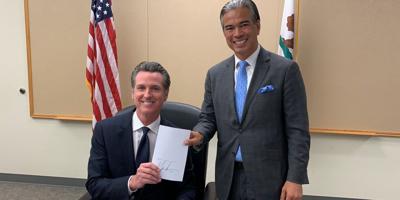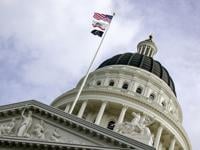
From left, California Gavin Newsom and California Attorney General Rob Bonta
OAKLAND - The federal government, joined by a growing number of business groups and others, have fired back at California's claims not even Congress may be able to remove the state's authority to essentially set emissions standards for the rest of the U.S., including potentially banning the sale of internal combustion engines.
On Sept. 19, the Justice Department filed a brief in Oakland federal court, asking the judge to dismiss the lawsuit lodged by California and 10 other states challenging recent action taken by Congress, together with the U.S. Environmental Protection Agency under President Donald Trump, to rescind the so-called "waiver" California has for decades relied upon to set vehicle emission standards far stricter than those established under federal law.
In the filing, the Justice Department says California has no legal or constitutional grounds on which to challenge the legislation enacted by both houses of Congress and signed into law by the President.
If Congress granted California the emissions waiver, Congress can also remove them, and California cannot use an older law enacted by Congress to invalidate a new law, constitutionally enacted by Congress.
"California lost a vote in Congress," the Justice Department wrote in its filing. "That does not violate the law."
The dispute landed in federal court earlier this year, shortly after the Republican-led Congress and Trump enacted legislation to strip California of its so-called "waiver" under federal environmental laws.
The waiver gives California the unique ability among all U.S. states to set air quality and vehicle emissions standards more stringent than would otherwise be allowed under federal law.
The federal action came in response to Democrat-dominated California's refusal to back down from implementing its so-called "Advanced Clean Cars" program. That program would slap stringent regulations onto automobiles sold in California, seeking to eventually force every vehicle sold in the state to be "zero emission" by 2035 in the name of fighting so-called "climate change" allegedly caused, in large part, by so-called "greenhouse gas" emissions from the exhaust of automobiles powered by diesel and gasoline.
That gas-powered car ban, however, was not approved by California lawmakers. Rather it was the result of rulemaking from the state's powerful California Air Resources Board (CARB) with the backing Democratic Gov. Gavin Newsom.
The gas car ban has drawn lawsuits from a coalition of oil and gas energy suppliers and others, who have asserted California has acted unconstitutionally to essentially use its special "waiver" and its outsized economic market power to attempt to ban gas-powered cars nationwide, sidestepping federal law and without input from the voters of any other states.
Since the 1960s, from the earliest days of the federal Clean Air Act, California secured that "waiver," under the presumption California needed the ability to set different standards to address its supposedly unique pollution problems.
However, in the decades since, other states have hitched their own emissions rules to California's. To date, 17 states and the District of Columbia have enacted laws to have their state emission rules mirror those set by CARB. These include the states of Colorado, Nevada, New York, New Jersey, Washington, Oregon and Pennsylvania, among others. Those states collectively cover at least 40% of the U.S. population.
Ten of those states, including New York and Washington, have joined California in its legal challenge against the U.S. government, seeking to preserve California's "waiver."
As California's economy and population has grown since the 1960s, however, its buying power relative to the rest of the country has also allowed the Golden State to use its "waiver" to all but set vehicle emission standards for the rest of the country and much of the world.
Automakers would neither make vehicles that would be unique to California, nor willingly surrender the ability to sell cars in California's massive markets. So automakers have produced automobiles which largely conform to California's standards, rather than those established under federal law, supposedly for the rest of the U.S.
And California's standards have increasingly tightened, ultimately leading to Newsom's push for standards so strict they would ultimately lead to a de facto ban on internal combustion-powered automobiles by 2035.
That, in turn, has led to conflict in politics and in the courts.
In 2019, during the first Trump administration, the EPA tried to rescind California's "waiver."
California, however, challenged that recission in court, arguing only Congress could revoke its waiver, because it was granted under a provision of the Clean Air Act itself.
However, that legal action dragged on beyond the end of Trump's first term, and the Biden administration reinstated the waiver.
That, in turn, triggered new legal challenges from energy companies and other states, who argued the waiver granted to California has been unconstitutional from the start. The legal challenges have asserted the Constitution requires the federal government to treat all states the same, regardless of their size, market share or unique environmental conditions.
In June, the U.S. Supreme Court ruled to allow energy companies to continue that lawsuit after lower court judges had sided with California's bid to dismiss.
Meanwhile, Republicans in Congress and Trump moved ahead with action under the federal Congressional Review Act law to officially rescind the "waiver."
That action was hailed by auto industry advocates and other business groups, who said the removal would end California's allegedly unconstitutional power over the other states and the country.
Newsom and California Attorney General Rob Bonta, however, moved quickly to challenge the new action in court, asserting Congress could not even strip the "waiver" in this manner.
The argument, according to California, centers on whether the "waiver" amounts to an environmental "rule" put forward by the EPA, and subject to congressional review under the CRA.
California, however, says it is something different, and therefore, the CRA doesn't apply.
In response, the Justice Department has sought to dismiss the action.
In the filing in support of its motion to dismiss, the Justice Department says California's argument is a nonstarter.
Essentially, they said, California is attempting to argue over how Congress reached its decision to rescind the "waiver." And the Justice Department said courts have no place in such a dispute over internal congressional rules and procedures.
Ultimately, the Justice Department, said the measure was passed by Congress and signed by President Trump, all constitutionally, making it law and stripping away the "waiver."
A growing mass of business advocacy groups have sought to also weigh in on the dispute, in support of the federal action.
According to court filings, 21 organizations have asked the court to allow them to intervene in the dispute to defend the rescission of the "waiver." California and its co-plaintiff states have opposed those petitions.
Other organizations have sought to file briefs in support of the Justice Department in the case.
In a proposed brief, the U.S. Chamber of Commerce would urge the court to similarly conclude that Congress can not only rescind the waiver, but use the CRA to do so.
To find otherwise, the Chamber argued, would give California and its partner states the ability to thumb their noses at Congress and "disrupt and augment what would otherwise be a nationally uniform legal and regulatory framework" created by Congress under the Clean Air Act.
"This is exactly the type of 'general applicability' and 'prospective effect' that fit the broad definition of a rule," the Chamber argues. "Indeed, the Waivers here have outsize nationwide impacts because of their effects on the national markets for vehicles, technology, and energy."
The case, the Chamber said, has no business in federal court, as nothing California points to in federal law or congressional procedures can outweigh the constitutional authority exercised by Congress to rescind the "waiver."
"When legislation has been passed by both Houses of Congress and signed by the President, this Court does not look behind the signed legislation to inquire whether it should have been able to pass through Congress," the Chamber wrote in its proposed brief.
"Points of order, parliamentary objections, and requests for further debate belong in the House and Senate chambers, not the federal courts."
U.S. District Judge Haywood S. Gilliam, who is presiding over the case, has not yet ruled on the motions to intervene or file the so-called "amicus curiae," or friend of the court briefs.
Gilliam was appointed to the court by former President Barack Obama.






